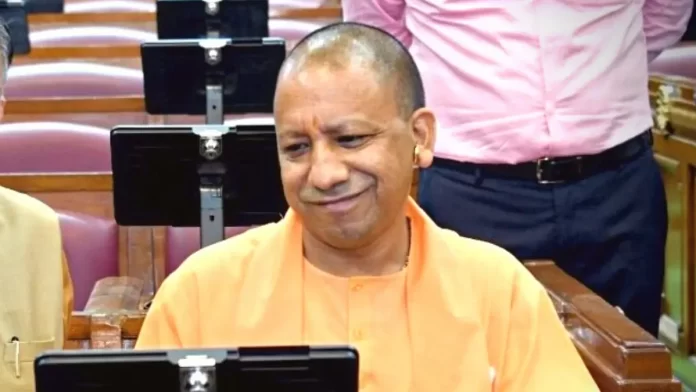Uttar Pradesh Chief Minister Yogi Adityanath on Friday called for a shift in the discourse surrounding disputed religious sites, stating that such structures should not be referred to as mosques, reported the Indian Express.
Speaking at an event in Mahakumbh Nagar, Prayagraj (Ilahabad) he said, “The day we stop calling disputed structures mosques, people will stop going there. Islam itself does not support hurting another’s faith to establish a place of worship. God does not accept prayers offered at such sites.”
Adityanath emphasized that Islam does not mandate a structure for worship, contrasting it with practices in Sanatan Dharma [Hindu-Brahmanism]. He urged society to embrace progressive thinking, stating, “This is a time to focus on unity and harmony rather than disputes of the past.”
Kisi bhi vivadit dhaanche ko masjid nahi bolna chahiye. Hum jis din masjid bolna bandh kar denge, uss din log jaana bhi bandh kar denge. Waise bhi yeh Islam ke sidhhanto ke khilaaf hai ki kisi ki bhi aastha ko thais pahuncha kar wahan masjid-numa dhaancha khada kar diya ho, aise sthaan par kisi prakaar ki hone waali ibaadat Khuda ko bhi manzoor nahi hoti hai. Islam me upasana ke liye structure ki zaroorat nahi hai, jab ki yeh Sanatan Dharma [Hindu-Brahmanism] me hai. (Translation: Any disputed structure should not be called a mosque. The day we stop calling it a mosque, people will stop going there. Hurting anyone’s faith by constructing a mosque-like structure does not align with Islamic principles, worship at such sites is not acceptable to God too. Islam does not mandate the construction of a structure for worship, but Sanatan Dharma [Hindu-Brahmanism] does.)
The comments come amid Supreme Court deliberations on petitions challenging the Places of Worship Act, which prohibits altering the status of religious sites as of August 15, 1947. The court has also ordered a status quo on fresh suits regarding ownership disputes over religious sites.
Also Read| Mosques in Islam: Know their Status & Importance from Quran and Hadith
Claims on Maha Kumbh Land
Responding to allegations that the ongoing Maha Kumbh in Prayagraj is being held on Waqf Board land, Adityanath dismissed the claims, asserting the site’s historical and religious significance. “This land has been associated with the Maha Kumbh for thousands of years. If someone now claims it as Waqf property, we must question whether it belongs to the Waqf Board or land mafias,” he said, warning that those attempting to assert such claims would face consequences.
He highlighted recent amendments requiring a review of land records dating back to 1363 Fasli for properties claimed by the Waqf Board. Public-use land, Hindu religious sites, and government-owned properties, he stressed, would not be allowed to fall into “malicious hands.”
Historical and Religious Context
Referring to the Jama Masjid in Sambhal, Adityanath questioned Waqf Board claims, pointing out that Sambhal has been historically rooted in Sanatan Dharma. “The Puranas mention Sambhal as the birthplace of Kalki, the tenth incarnation of Lord Vishnu. Five thousand years ago, there was no Islam, so how could there be a mention of Jama Masjid?”
He also cited Ain-i-Akbari, which records the demolition of a Vishnu temple to build the Jama Masjid in Sambhal in 1526, and the destruction of the Ram temple in Ayodhya in 1528 to construct a structure on Ram Janmabhoomi. “These historical mistakes should be acknowledged, and the land should be voluntarily returned to the Hindu community,” he said, adding that such gestures would foster mutual respect and harmony.
Call for Unity and Faith
Adityanath underscored the importance of respecting faith and India’s deep-rooted spiritual traditions. He expressed confidence in the judiciary to ensure justice while highlighting the significance of the Maha Kumbh as a unifying event.
“The Maha Kumbh, being held after 144 years during such auspicious times, reflects the spirit of Ek Bharat, Shreshtha Bharat. Devotees from across the country and the world come together here without discrimination,” he said.
Adityanath also criticized previous governments for neglecting the Maha Kumbh’s organization. He claimed the event was once synonymous with chaos and filth, contrasting it with the current arrangements under his administration.
“Faith and cultural ethos form the foundation of this country. By God’s grace, Ram Lalla was installed in Ayodhya a year ago, ending a 500-year wait. This event marks a new chapter in celebrating India’s rich heritage,” he concluded.
कामैस्तैस्तैर्हृतज्ञाना: प्रपद्यन्तेऽन्यदेवता: |
तं तं नियममास्थाय प्रकृत्या नियता: स्वया || 20||
(Those whose knowledge has been carried away by material desires surrender to the celestial gods. Following their own nature, they worship the devatās, practicing rituals meant to propitiate these celestial personalities. Bhagavad Gita 7:20)
Also Read| Bhagavad Gita Quotes on God, Deities, Religions and Rituals: Common Threads of Wisdom
